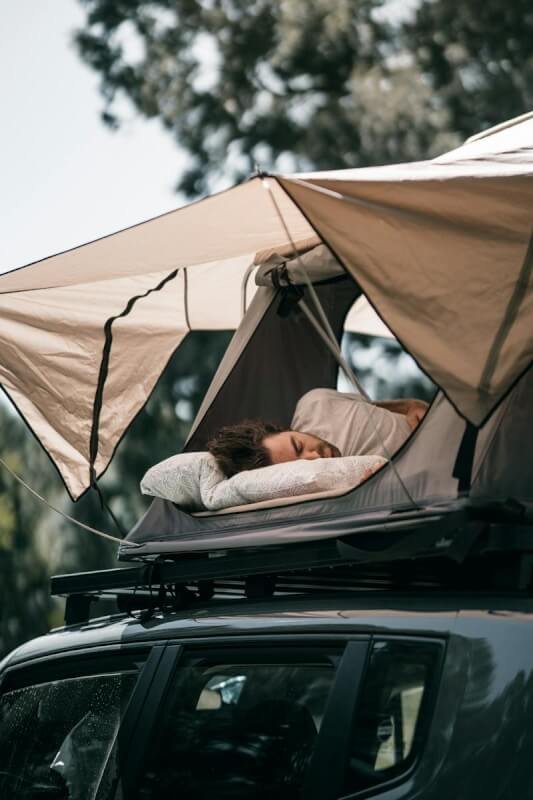Imagine yourself lying under the stars, surrounded by the peaceful sounds of nature, and feeling a gentle breeze brushing against your face. As you drift off to sleep, you can’t help but wonder: what camping gear is essential for a comfortable night’s rest? Whether you’re a seasoned outdoor enthusiast or new to camping, having the right gear can make all the difference in ensuring a restful night under the open sky. From a cozy sleeping bag to a supportive camping mattress, this article will guide you through the must-have gear for a truly peaceful slumber in the great outdoors.
Tent
When it comes to a comfortable night’s sleep while camping, choosing the right tent is crucial. The size and capacity of the tent should align with your needs. Consider the number of people who will be sleeping in the tent and whether you want extra space for gear. A tent that is too small can be cramped and uncomfortable, while a tent that is too large may be difficult to set up and take down.
Weather resistance is another important factor to consider. Look for a tent with a waterproof or water-resistant outer shell to protect you from rain showers. Additionally, a tent with good ventilation will help prevent condensation and keep the interior cooler during hot summer nights.
Ease of setup is also worth considering, especially if you are camping alone or with children. Look for a tent with color-coded poles and clear instructions to make setup a breeze. Some tents even come with pre-attached poles, making setup even easier. The last thing you want after a long day of hiking is to spend hours struggling with a complex tent setup.
Sleeping Bag
A good sleeping bag is essential for a comfortable sleep outdoors. One of the most important factors to consider is the temperature rating of the sleeping bag. This rating indicates the lowest temperature at which the bag will keep you warm. If you’re camping in colder climates, look for a sleeping bag with a lower temperature rating to ensure you stay cozy throughout the night.
The insulation type of the sleeping bag is also important. Down insulation provides excellent warmth and compressibility, but it may not perform well when wet. Synthetic insulation, on the other hand, retains its insulating properties when wet and dries quickly. Consider the weather conditions and your personal preferences when choosing between these options.
Size and weight are also considerations when selecting a sleeping bag. Make sure the length of the sleeping bag accommodates your height, and consider the packed size and weight if you will be carrying it on long hikes. Sleeping bags with a mummy shape tend to be lighter and more compact, while rectangular sleeping bags offer more room to move around.
Sleeping Pad
A sleeping pad is vital for providing cushioning and insulation from the cold ground. The type of padding in the sleeping pad will determine its comfort and durability. Foam pads are lightweight, affordable, and can provide good insulation, but they may not offer as much cushioning as inflatable pads. Inflatable pads, on the other hand, are more comfortable and can be adjusted for firmness, but they may be more prone to punctures.
Thickness is an important consideration when choosing a sleeping pad. Thicker pads provide more cushioning and insulation, especially for side sleepers or those with pressure points. However, they may be bulkier and less portable than thinner pads. Consider your comfort needs and the space you have available when making this decision.
The inflation method of the sleeping pad is also worth considering. Some pads require manual inflation by blowing into a valve, while others come with built-in pumps or can be inflated using a camping pump. Think about your preferences and the ease of inflation when selecting a sleeping pad.
Pillow
A comfortable pillow can make a world of difference in ensuring a good night’s sleep while camping. When it comes to size and shape, choose one that aligns with your sleeping preferences. Some people prefer a traditional rectangular pillow, while others opt for a contoured shape that offers better neck support. Consider what feels most comfortable to you.
The filling material of the pillow is another aspect to consider. Foam-filled pillows provide good support and retain their shape well, while inflatable pillows offer adjustable firmness. Down-filled pillows offer the softest and most luxurious feel, but they may not provide as much support. Consider your desired balance of comfort and support when choosing a filling material.
Portability is also a factor to consider when selecting a camping pillow. Look for a pillow that can be compressed or folded down to a compact size, making it easy to carry in your backpack. Some pillows even come with a stuff sack or a built-in storage pouch, making them even more portable and convenient.
Blanket or Quilt
In addition to a sleeping bag, a blanket or quilt can provide an extra layer of comfort and versatility. The material and insulation of the blanket or quilt will determine its warmth and durability. Look for blankets or quilts made of high-quality materials that are both soft and durable. Synthetic insulation can provide good warmth even when wet, while down insulation offers excellent warmth-to-weight ratio.
Size and weight are also important considerations when choosing a blanket or quilt. A larger blanket or quilt will allow for more coverage and freedom of movement, but it may be bulkier and less portable. Consider your camping needs and preferences when deciding on the size and weight of your blanket or quilt.
Versatility is another advantage of using a blanket or quilt. Unlike a sleeping bag, a blanket or quilt can be easily used for activities other than sleeping, such as lounging around the campfire or picnicking. This multifunctionality adds value to your camping gear and enhances your overall camping experience.
Air Mattress
For those who prefer camping with a bit more comfort, an air mattress can provide a luxurious sleeping surface. The size and height of the air mattress should align with your preferences. Consider whether you want a single or double mattress and how high you want it to be off the ground. A higher mattress can be easier to get in and out of, but it may require a larger tent.
The inflation method of the air mattress is also worth considering. Manual inflation involves using a pump or your breath to inflate the mattress, while some air mattresses come with built-in pumps for faster and easier inflation. Some models even offer electric or battery-operated pumps for maximum convenience. Choose the inflation method that suits your needs and preferences.
Durability is an important factor to consider when choosing an air mattress. Look for a mattress made of high-quality materials that are puncture-resistant and can withstand rough terrain. Reading reviews and checking the warranty can also give you an idea of the mattress’s durability. Investing in a durable air mattress will ensure many comfortable nights of sleep while camping.
Cot or Hammock
For campers who prefer to sleep off the ground, a cot or hammock can provide a comfortable and elevated sleeping experience. The comfort and support offered by a cot or hammock are important factors to consider. Look for a cot or hammock with a sturdy frame and a supportive sleeping surface. A hammock should have proper suspension straps and be made of durable materials to ensure a comfortable and secure sleep.
Portability is another advantage of choosing a cot or hammock. Cots can often be folded down to a compact size and come with carrying bags for easy transportation. Hammocks are lightweight and easy to pack in a backpack. Consider your camping style and transportation needs when selecting a cot or hammock.
Setup and stability are also important considerations. Look for a cot or hammock that is easy to set up, preferably without the need for additional tools. A stable and secure sleeping surface will ensure a restful night’s sleep and peace of mind. Consider reading reviews and checking the stability ratings of different models before making a decision.
Earplugs and Eye Mask
While not a physical gear item, earplugs and an eye mask can greatly enhance your sleep quality while camping. Earplugs can reduce noise disturbances, whether from snoring campers or nearby wildlife. Look for earplugs specifically designed for sleep, as they tend to provide better noise reduction and comfort.
An eye mask can effectively block out light, allowing you to sleep even during bright mornings or when camping near areas with artificial lighting. Look for an eye mask made of soft and breathable materials for maximum comfort. Adjustable straps can ensure a secure fit and prevent the mask from slipping off during the night.
Comfort is key when it comes to earplugs and eye masks. Choose earplugs made of soft and hypoallergenic materials that mold to your ear shape for a comfortable fit. For the eye mask, opt for one with a contoured shape that does not put pressure on your eyes or disturb your sleep.
Campground Selection
Apart from the gear you bring, campground selection plays a crucial role in ensuring a restful night’s sleep. Consideration of noise and lighting is important when choosing a campsite. Avoid campgrounds near busy roads, popular hiking trails, or crowded areas. These areas tend to be noisier and may disturb your sleep. Look for quieter, more secluded campsites for a peaceful night’s sleep.
Level ground is another consideration. Choose a campsite with a flat and even surface to ensure a comfortable sleep. Sleeping on uneven ground can result in discomfort and poor sleep quality. If possible, bring a tent footprint or tarp to place under your tent for added comfort and protection against moisture.
Proximity to facilities is also worth considering, especially if you need access to restrooms or showers during the night. Camping near the facilities can make late-night trips more convenient and prevent you from having to walk long distances in the dark.
Conclusion
Investing in quality camping gear is essential for a comfortable night’s sleep. Consider your personal preferences and camping needs when selecting gear. Take the time to test and adjust your gear before embarking on a camping trip to ensure maximum comfort and satisfaction.
Remember that everyone’s sleep preferences and needs are different, so what works for one person may not work for another. Pay attention to your own comfort levels and make adjustments as necessary. With the right gear and a bit of experimentation, you’ll be able to enjoy a restful and rejuvenating night’s sleep while camping. Happy camping!


